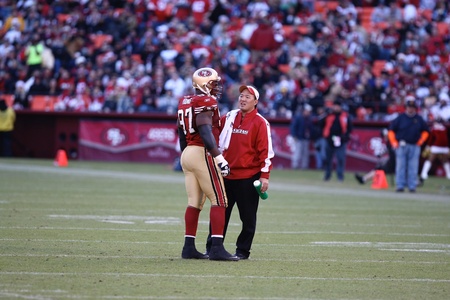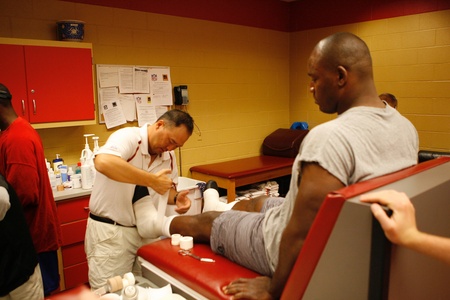Watch a Chicago Bulls game and try to find Jeff Tanaka.
On gameday he’ll be sitting courtside, but he’s not one of the myriad of celebrity fans in the vein of Bill Murray, Kanye West, or Barack Obama. He’s not a high-profile businessman. He’s not a player, an official, or an assistant coach.
Tanaka is the head athletic trainer, and every game he’s there, usually in a sweater of varying color on top of a button down and khakis, in the first seat on the Bulls’ bench — an integral part of the team’s operations and a key piece of Bulls’ head coach Jim Boylen’s staff.
Now entering his sixth season as head trainer in Chicago, Tanaka came a long way against a stacked deck to reach the hallowed halls of the United Center. Only seven NBA teams employ a person of color as their head athletic trainer, and Tanaka is one of just three Asians.
“There’s not a lot of Asian Americans in that field, at least not when I was around it,” former San Francisco 49ers defensive tackle Bryant Young said. “So I thought it was cool when Jeff was really opening up doors for people of Asian American descent.”
Young got to know Tanaka during the ten years when the latter was an assistant athletic trainer in San Francisco from 1999-2008, his final stop before moving to Chicago to take the Bulls job.
But Tanaka’s first job in the sports medicine industry was about 50 miles south of Candlestick Park on Highway 101 at Branham High School, his alma mater, in San Jose. Tanaka loved playing sports growing up, but by the time he was suiting up for the Bruins’ football team he knew a future as an athlete wasn’t in the cards.
“It’s always a bad sign when you’re a special teams guy on your high school team,” Tanaka joked. “I practiced some football, I can’t say I really played a lot of football.”
He did play enough to get injured though, which required physical therapy. And while receiving treatment, the San Jose native realized becoming an athletic trainer was another route for him to stay involved with sports beyond his athletic ceiling.
Tanaka enrolled at Cal Poly San Luis Obispo for college where he majored in physical therapy and met one of the most important mentors of his professional career — Steve Yoneda. A fellow Japanese American, he helped show Tanaka the world of sports medicine and get started on his path.
“It was just fortuitous and a cool opportunity to have someone with a similar background doing something that I aspired to do,” Tanaka said. “He had a lot of knowledge and experience to draw from and he was a great mentor to dozens of us, regardless of ethnic background.”
Likewise, Yoneda recalled that Tanaka was a near constant presence in the training facility almost immediately after he enrolled. And Yoneda believed that the young man had all the hallmarks of a successful trainer due to his work ethic, questions, and commitment to learning the craft. He even says Tanaka lived directly across the street from the treatment center just to make it that much easier to come and help out.
“He spent a lot of time in the facility, just observing, working and helping,” Yoneda said. “He pretty much jumped in feet first.”
Tanaka, Yoneda, and the rest of the undergraduate students bonded over one-pot meals that included Japanese American classics like chili rice and teriyaki spam in the teacher’s office after games. And during the football season, Yoneda took a few of his top students on the road as his assistants, exposing them to real life work as a trainer.
Since Cal Poly was a Division II school at the time and extra assistants weren’t in the budget, Yoneda and his students road tripped to the game on his own dime. And though the hands-on practice was valued, it wasn’t the main thing Tanaka looks back on from those excursions.
“We would pile into his minivan and road trip it as a staff,” he said. “And we would just be in the car, listening to music, talking about stories Steve had from his MLB experience, and sharing our college experiences. That’s what I really remember.”
Tanaka finished his bachelor’s degree in 1995, and began his first stint with the 49ers as a graduate assistant under National Athletic Trainer’s Association Hall of Fame member Lindsy McLean while he also pursued a master’s at San Jose State.
And upon his second graduation in 1997, Tanaka had a short tenure as part of the training staff for the Amsterdam Admirals in the World League of American Football. His time in the Netherlands was exciting — it was his first time living outside of Northern California — but he returned after six months to take a position with UC Berkeley under Fred Tedeschi.
Another former McLean assistant, Tedeschi heard about Tanaka through their shared mentor, who recommended Cal find a way to get the young trainer on staff. So Tedeschi created a position just for Tanaka as the trainer for the Cal men’s basketball team and the swimming teams, which took the San Jose native away from his roots in football.
“I put him in a tough spot,” Tedeschi said. “But within a short time he transitioned to the men’s basketball role. He did well in that role and the student athletes really gravitated towards him.”
Tedeschi left UC Berkeley in 1998 to take the head trainer job with the Bulls, and a year later, McClean lured Tanaka back to the 49ers where he was re-acquainted with Young.
A 14-year NFL veteran and 49ers all-time sack leader, Young was a second year player when Tanaka spent time with San Francisco as a graduate assistant in the early ‘90s. And the latter’s return in 1998 marked the beginning of almost a decade of friendship between the pair.
According to Young, he was originally drawn to Tanaka because of the trust the athlete was able to put in the trainer’s practices and knowledge. And as time went on, Young also experienced, first hand, how invested the trainer was in the wellbeing and health of the players he worked with.
“The attitude, motivation, and just the energy and vibe you give off [as a trainer] is contagious,” Young said. “Sometimes guys aren’t feeling it and a trainer needs to know how to motivate them to continue rehab. Jeff had the energy and charisma, and he gained the trust of the guys, or at least from me.”
Though Young couldn’t pinpoint an exact moment that bonded him and Tanaka, he said it was really the culmination of several smaller things that the then assistant trainer did to earn his trust.
Sometimes you can’t see the light at the end of the tunnel [of a rehab],” Young said. “But that’s when Jeff assures you. And over time, with consistency, you build trust and move forward.”
A year after Young retired from the NFL, Tedeschi came calling with a vacancy on his staff in Chicago. McLean had retired in 2003, and Tanaka was looking for a fresh start so he jumped on the chance and moved to Chicago to become the Bulls assistant trainer.
According to Tedeschi, Tanaka was able to bring some therapeutic football techniques to the basketball world, and adding some outside perspective. And after just one season of acclimating to the NBA, Tedeschi says he would have felt comfortable handing over the reigns as head trainer.
Tanaka also began to earn national recognition, being named David Craig NBA Assistant Athletic Trainer of the Year for the 2011-12 season. But what Tedeschi remembered most from their six years in Chicago together were Tanaka’s ability to bond with the players — Derrick Rose went to Tanaka’s wedding — and his assistant’s willingness to talk about his family history.
“I learned about his family’s story from the internment camps and how it’s a part of his history.” Tedeschi said. “It’s all of our history too, but how he was able to talk about it, acknowledge it, and how he used it to drive himself as a person was really inspiring to watch.”
In 2014, Tedeschi, a two-time winner of the Joe O’Toole Head Athletic Trainer of the Year in his own right, decided to take a director role with Oregon State. He immediately recommended Tanaka for the role of head trainer.
“He was clearly ready to lead the unit,” Tedeschi said. “You could see he had the ability and once he had the nuances of the schedule and the travel and the experience, it was a logical transition that he would assume the role.”
Since Tanaka has taken over as the Bulls head trainer, he’s had more to adapt to than just a promotion at work. He got married in 2012 and had his first child in 2014. Now a father of two kids, he says the travel demands have become the toughest part of the job and he wouldn’t be able to do it without the support and understanding from his wife.
But his future with the Bulls seems relatively secure from his end. Tanaka has outlasted four head coaches in Chicago: Vinny Del Negro, Tom Thibideau, Fred Hoiberg, and currently works under Boylen. And as long as they’re happy with his work, he’s happy to stay.
“They’re very supportive, very loyal to their people,” Tanaka said. “They do a good job taking care of us, giving us support and the resources we want and need. And that’s really all you can ask for.”
And while he continues to work for the Bulls, Tanaka wants to continue to be a visual presence for Japanese Americans. He also tries to be a mentor in the field as his current assistant, Arnold Lee, is also an Asian American, and in 2019, he travelled to Japan as part of Basketball without borders.
“I didn’t exactly choose a traditional career path or profession, and maybe a lot of Asian Americans don’t realize or understand what our profession is,” Tanaka said. “Maybe that contributes to the lack of diversity because we are as able and eligible for any field as anybody else.”
But he did have this one bit of advice for any Asian Americans who might be interested in a career in sports medicine or as a trainer.
“Just don’t be limited to what you think an Asian American should be.”
SAnd look where that has got him. Tanaka is not a tech billionaire. He’s not a famous musician. But when tipoff comes at the United Center, he’ll be sitting where he always does, in that first chair on the bench. Now you just know where to look for him.
*This article was originally published by NikkeiWest on Dec. 25, 2019.
© 2020 Andy Yamashita




